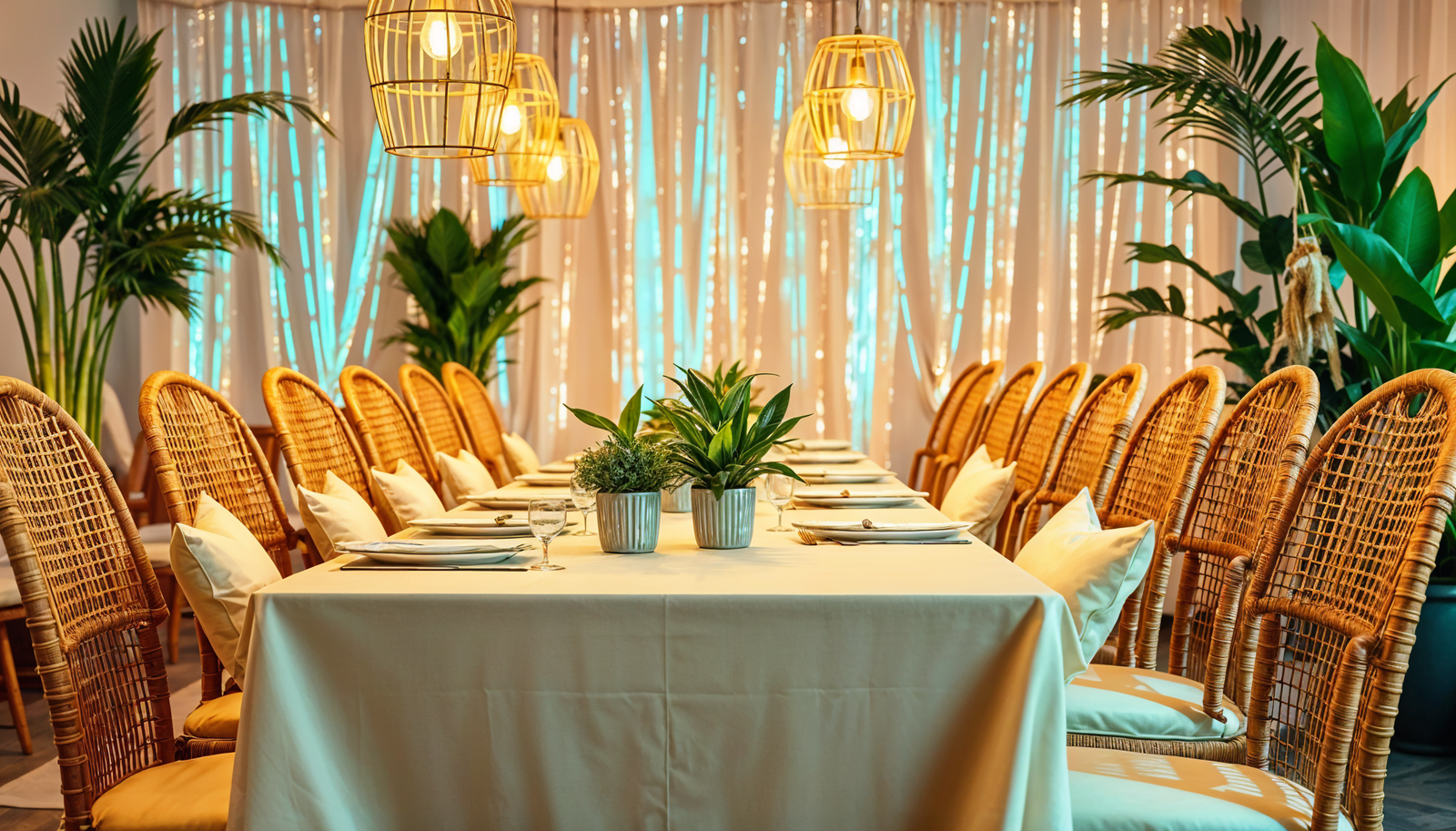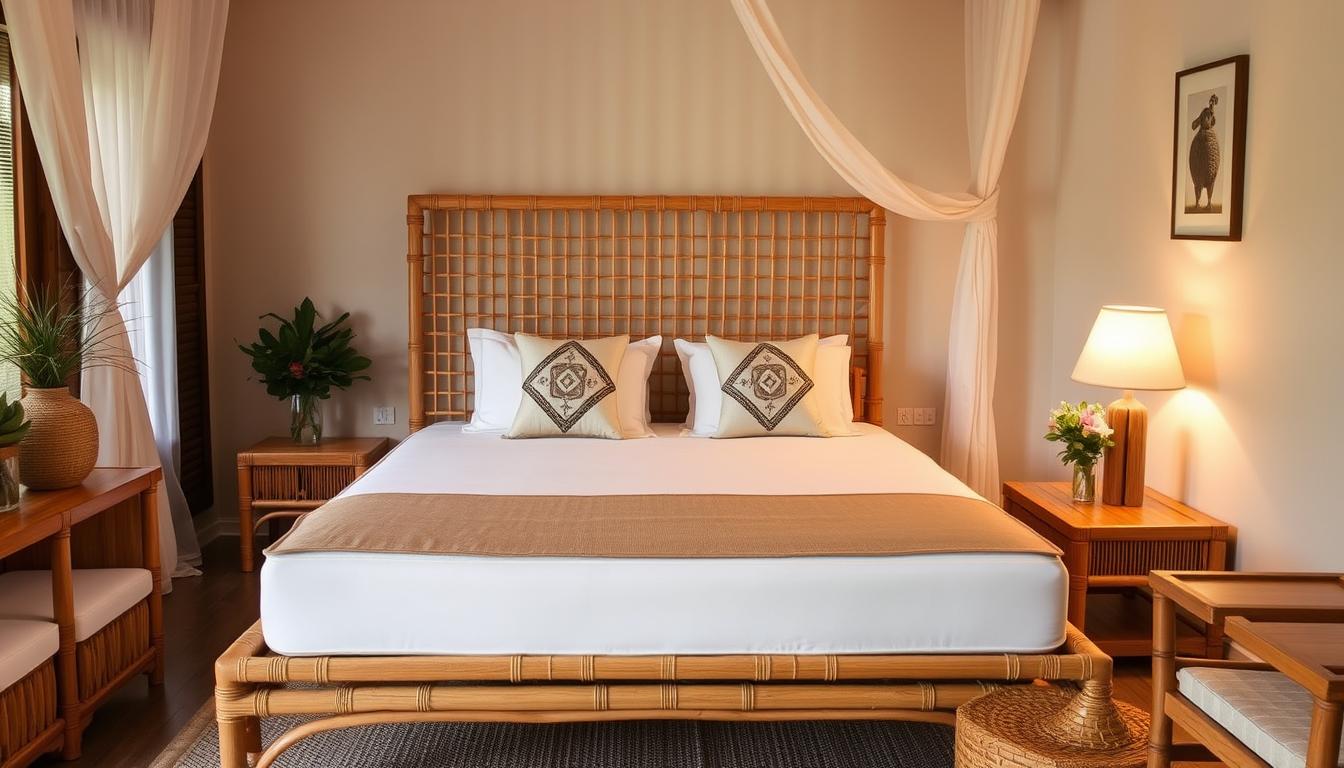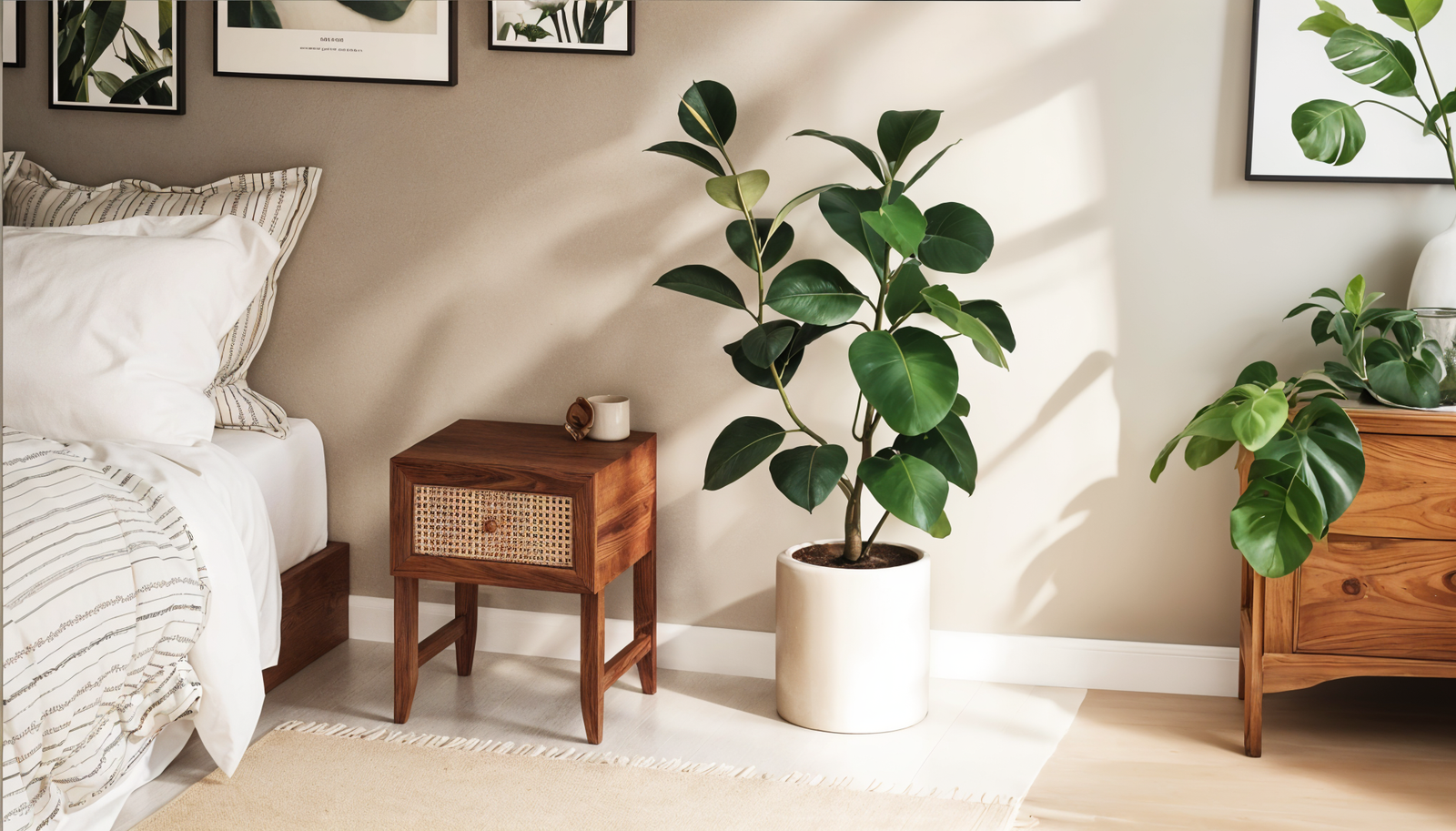🤍 Unmatched Quality, Authentic Craftsmanship
🤍 Unmatched Quality, Authentic Craftsmanship
🤍 Unmatched Quality, Authentic Craftsmanship
In this article, we will explore Japandi daybed ideas that seamlessly blend comfort and style, creating a harmonious and elegant living space.
The Japandi style combines the understated simplicity of Scandinavian design with the timeless elegance of Japanese minimalism.
By incorporating the principles of both aesthetics, Japandi daybeds offer a unique and versatile solution for modern homes.
Join us as we delve into the world of Japandi daybeds and discover creative ways to incorporate them into your own interior design.

In this section, we will take a closer look at the Japandi aesthetic and its influence on daybed design.
Japandi style is a delightful fusion of Scandinavian minimalism and Japanese elegance, resulting in a harmonious and serene living space.
The Japandi style embraces simplicity and clean lines, celebrating the beauty of minimalist design.
It combines the functional elements of Scandinavian interiors with the refined elegance of Japanese aesthetics.
The result is a seamless blend of form and function.
When it comes to Japandi daybeds, their key features embody the essence of the style.
Minimalist design, clean lines, and a focus on functionality are at the forefront.

As you explore the world of Japandi daybeds, you'll discover their unique ability to bring comfort and style together.
The combination of minimalist design, clean lines, and natural materials create a harmonious and inviting space for relaxation and rejuvenation.
In the next section, we will explore the fusion of functionality and simplicity that defines Japandi daybeds in more detail.
In this section, we will delve into the fusion of functionality and simplicity that defines Japandi daybeds.
Japandi design is the perfect marriage of Scandinavian functionality and Japanese minimalism, resulting in a style that is both elegant and practical.
By incorporating the principles of both aesthetics, Japandi daybeds offer a unique and versatile solution for modern homes.

Japandi daybeds are the epitome of minimalist living, combining clean lines, understated elegance, and a focus on practicality.
These daybeds are more than just stylish pieces of furniture; they serve a variety of functions, making them multi-functional furniture at its best.
One of the key features of Japandi daybeds is their space-saving design.
They are designed to maximize functionality without sacrificing style, making them perfect for smaller living spaces or rooms that serve multiple purposes.
Moreover, Japandi daybeds can transform seamlessly from a seating area during the day to a comfortable sleeping area at night.
The ability to adapt to different needs and occasions is what sets Japandi daybeds apart from traditional daybeds or sofas.
Whether you want to lounge, relax, work, or accommodate guests, Japandi daybeds offer the perfect balance of form and function.
They embody the essence of minimalist living, providing a clutter-free and serene environment where you can truly unwind.
Transform your living space into a tranquil oasis with a Japandi daybed.
Incorporating the principles of Japanese minimalism and Scandinavian functionality, Japandi daybeds offer the perfect blend of comfort and style for creating a minimalist haven.

One of the remarkable features of Japandi daybeds is their versatility as multifunctional furniture.
These daybeds can serve not only as a comfortable seating area but also as a guest bed or even a workspace.
This makes them an excellent choice for those seeking practical solutions in limited living spaces.
When using a Japandi daybed as seating, enhance the functionality by adding storage elements such as built-in drawers or shelves.
This allows you to maximize space and keep the area organized.
An adjustable tabletop or a pull-out desk can also transform your Japandi daybed into a productive workspace, providing you with a dedicated area for work or study.
Whether you're looking to create a minimalist haven or need multifunctional furniture options, Japandi daybeds offer endless possibilities for interior design inspiration.
Explore these ideas and make a statement with your own Japandi daybed.
In the world of Japandi design, the choice of materials plays a crucial role in creating a harmonious and sustainable space.
When it comes to your Japandi daybed, selecting the right elements is essential to achieving the desired aesthetic and promoting ec
o-friendly living.

One of the key principles of Japandi design is the use of natural elements.
Incorporating materials such as natural wood, bamboo, and organic textiles not only adds warmth and texture to your daybed but also contributes to the overall ethos of sustainable design.
These eco-friendly materials not only bring a sense of natural beauty to your space but also minimize the environmental impact.
When choosing materials for your Japandi daybed, opt for sustainable options that are responsibly sourced and produced.
Look for certifications such as the Forest Stewardship Council (FSC) for wood and the Global Organic Textile Standard (GOTS) for textiles to ensure that the materials align with your values of sustainability and ethical living.
In addition to natural elements, consider incorporating other eco-friendly materials, such as low-VOC (Volatile Organic Compounds) paints and finishes.
These materials have reduced levels of harmful chemicals, promoting a healthier indoor environment.
In summary, the choice of materials for your Japandi daybed is crucial to creating a space that is both aesthetically pleasing and environmentally conscious.
By opting for natural elements and sustainable design principles, you can contribute to a more eco-friendly and beautiful living environment.
Incorporating the right color and texture into your Japandi daybed design can truly elevate its visual appeal and create a serene atmosphere.
By focusing on neutral palettes and natural materials, you can achieve a harmonious blend of Scandinavian simplicity and Japanese minimalism.
When it comes to color, opting for neutral palettes is key in the Japandi style.
Shades of white, beige, gray, and taupe provide a calming backdrop for your daybed, allowing the organic elements to take center stage.
These subtle hues also help to create a sense of balance and tranquility in your space.
When selecting materials for your Japandi daybed, prioritize natural elements.
Choose sustainably sourced wood for the frame, such as oak or teak, which not only adds warmth and authenticity but also aligns with the eco-friendly principles of the Japandi aesthetic.
Incorporating organic textiles, such as linen or cotton, further enhances the connection to nature.
Adding textural contrast is another way to bring your Japandi daybed to life.
Consider combining smooth surfaces with rough or tactile textures to create visual interest and depth.
For example, pair a minimalist linen daybed cover with a chunky knit throw or a woven rattan basket for storage.
By juxtaposing different textures, you can create a dynamic and engaging visual experience.
Experiment with materials like rattan, bamboo, or even stone to introduce elements with unique textures that stand out against the clean lines of your daybed.
Remember, the goal is to maintain a sense of simplicity and harmony even while incorporating textural contrast.
Strive for a balanced composition that complements the Japandi aesthetic.
In conclusion, color and texture play an integral role in bringing your Japandi daybed to life.
By opting for neutral palettes and natural materials, you can create a calming and harmonious atmosphere.
Additionally, incorporating textural contrast adds visual interest and depth to your daybed design, elevating it to new heights of style and sophistication.
Styling your Japandi daybed requires careful consideration of complementary accessories to enhance its overall aesthetic.
By selecting the right accessories, you can create a cohesive and visually appealing look for your space.
Here are some practical tips for styling a Japandi daybed:
When choosing accessories for your Japandi daybed, opt for items that align with the minimalist and natural qualities of the Japandi style.
Look for accessories made from organic materials such as bamboo, rattan, or natural fibers.
Incorporating plants, such as bonsai trees or small potted succulents, can also add a touch of greenery and create a calming ambiance.
Remember to keep it simple and choose accessories that contribute to the overall serenity of your space.
To achieve a cohesive and visually appealing look with your Japandi daybed, consider arranging the surrounding furniture and decor thoughtfully.
Place your daybed in a central location within the room where it can be the focal point.
Consider pairing it with a low coffee table made from natural wood or a simple floor lamp with a minimalist design.
Use neutral colors, such as whites, grays, and earth tones, for the walls, curtains, and rugs to maintain a serene and cohesive atmosphere.
In order to create cohesive and visually appealing Japanese-inspired living spaces, it is important to select Japandi furniture that complements your daybed.
By choosing the right pieces, you can enhance the overall aesthetic and design of your room.
Whether you are looking for minimalist storage solutions or functional seating options, there are a variety of Japandi furniture ideas to inspire you.
One key aspect of Japandi design is the use of complementary pieces that contribute to a cohesive look.
For example, consider incorporating simple and clean lines into your furniture choices to align with the minimalist aesthetic.
Opting for natural materials like wood or bamboo can also add warmth and a sense of organic beauty.
When selecting Japandi furniture, functionality is another important factor to consider.
Look for pieces that serve multiple purposes, such as a storage bench or a coffee table with built-in storage compartments.
These functional furniture items not only provide practical solutions for organizing your space but also contribute to the overall aesthetic of your Japandi design.

| Furniture Piece | Description |
|---|---|
| Minimalist Storage Bench | A sleek and simple storage bench that can be used to store extra blankets, pillows, or other necessities. Its clean lines and minimalist design blend seamlessly with the Japandi aesthetic. |
| Low Coffee Table with Built-In Storage | A low coffee table that not only provides a surface for your drinks and snacks, but also features hidden storage compartments for books, magazines, or remote controls. Its compact design and natural materials make it an ideal addition to a Japandi-inspired living room. |
| Floor Cushions | Comfortable floor cushions that can be used as extra seating or as a cozy spot for relaxation. Opt for neutral colors and organic textiles to maintain the Japandi aesthetic. |
| Open Shelving Unit | An open shelving unit made of natural wood that provides both storage and display space for your favorite books, plants, or decorative items. Its minimalist design and clean lines align perfectly with the Japandi style. |
| Daybed with Storage Drawers | A daybed with built-in storage drawers that offers a comfortable place to relax during the day and a cozy spot to sleep at night. Its functional design and natural materials make it a suitable choice for a Japandi-inspired bedroom or living room. |
By incorporating these Japandi furniture ideas into your space, you can create a cohesive design that complements your daybed and enhances the overall aesthetic of your room.
Whether you are looking to add storage solutions, seating options, or decorative elements, there are plenty of Japandi-inspired furniture pieces to choose from.
Incorporating natural elements into a daybed design can create a soothing and rejuvenating environment that brings a touch of the outdoors into your living space.
Nature-inspired design and biophilic living have gained popularity due to their ability to create a sense of calm and connection with the natural world.
By integrating organic materials, such as natural wood, bamboo, and organic textiles, you can enhance the overall aesthetic and create a harmonious atmosphere around your daybed.
To further embrace biophilic living, consider incorporating plants and natural light into your daybed area.
Plants not only bring beauty and freshness but also improve air quality and create a sense of tranquility.
Position your daybed near a window to allow natural light to filter in, enhancing the natural elements and creating a serene ambiance.
By integrating organic materials, plants, and natural light, you can transform your daybed into a sanctuary that promotes relaxation and well-being.
The use of natural elements in your daybed design promotes a connection to nature, fosters a sense of peace, and enhances the overall aesthetics of your space.
Now that you have read the above article, maybe you still have a couple of questions on this topic, so we will answer these questions below.
A Japandi daybed is a piece of furniture that combines the simplicity and functionality of Scandinavian design with the elegance and minimalism of Japanese aesthetics.
It offers comfortable and stylish seating and a sleeping area, making it a versatile addition to any living space.
To style your Japandi daybed, you can select complementary accessories such as neutral-colored pillows, throws, and rugs.
Consider incorporating elements of nature, like plants or artwork inspired by natural landscapes.
You can also arrange the daybed against a wall or in the center of a room, depending on your desired look and the layout of your space.
Japandi daybeds can be found at various furniture stores, both online and offline.
Look for retailers that specialize in modern and minimalist furniture designs.
You can also consider visiting boutique stores that offer unique and curated furniture pieces, such as Mojo Boutique.
In conclusion, Japandi daybeds offer the perfect blend of comfort and style, making them ideal for those who appreciate minimalist living.
By seamlessly combining the principles of Scandinavian functionality with Japanese minimalism, Japandi daybeds create a harmonious and elegant living space.
With their clean lines, versatile designs, and natural materials, Japandi daybeds provide a versatile furniture solution for modern homes.
Whether you need extra seating, a cozy reading nook, or a guest bed, a Japandi daybed can effortlessly transform to meet your needs.
We hope that this article has inspired you to explore the world of Japandi daybeds and incorporate their unique aesthetics into your own living spaces.
By embracing the Japandi style, you can create a serene and clutter-free environment that promotes relaxation and tranquility without compromising on style and functionality.


